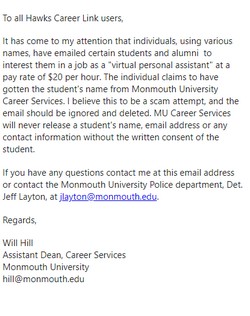An alert message was sent to University students and alumni concerning fraudulent e-mails offering nonexistent paid positions as a virtual personal assistant on Oct. 1.
In a screenshot of the fraudulent e-mail provided by William Hill, Assistant Dean of Career Services, the spammer claims to have gotten the contact’s name from the Monmouth University Career Services offices. The Spammer posed as a Career Services employee and sent an e-mail to students that would offer compensation of $20 an hour, in exchange for tasks that included running errands and paying bills for the spammer.
In February 2018, thousands of fraudulent e-mails were sent out to Monmouth students by an unknown source, telling students to click on an attached link to update their eCampus log-in information. Approximately 50 student accounts were compromised and forced to send out unsolicited e-mails, leading Monmouth’s technical support team to notify other University employees about the incident. This time, no one was affected by the single email blast, according to Hill.
According to Jeffrey Layton, Monmouth University Police Corporal, any student who accepted the nonexistent position would then be instructed to deposit a fraudulent check in their account on behalf of the spammer, and then take the amount of the check as personal compensation to buy gift cards. The spam victim would then be required by the scammer to give them the numbers on the gift card, under the false promise of redemption through a check.
“There is no way to catch the criminals,” Layton said. “Each time we trace the e-mails, we find they are overseas, or they are spoofed e-mail addresses.”
For students to protect their personal information, Layton recommends reporting any suspicious e-mails to campus police for them to investigate. He also encourages students to be diligent and look out for various red flags in the e-mail that would indicate the information is not truthful.
“If you Google the name and phone number used by the scammer, you find all the other reported frauds,” Layton said. “If you examine the e-mails you exchange, you will find in many cases the grammar is so bad it could not be coming from a business person.”
In the past year, Monmouth University has been forced to deal with numerous instances of fraudulent e-mails being sent to students.
Jett Vernaci, a junior mathematics student, said that he had received an e-mail from an unknown address this summer, which claimed there was a mandatory meeting on campus he needed to attend. After responding to the e-mail, Vernaci said his student account was hacked and he was sent thousands of e-mails from spammers, telling him that his account was now blocked.
“I had to call the help desk and have them reset my passwords,” Vernaci said. “I thought I lost my account.”
Another student, sophomore music industry student Kristen Wilczewski, said she had not heard about the fraudulent e-mails being sent, but would keep a closer look out for any in the future. “I would report any suspicious e-mail and not open it, because it might have a virus,” she said.
According to Gil Eckert, a specialist professor in information technology, scammers gain access to e-mail systems by figuring out the structure of e-mails sent by specific organizations, such as the addresses of students whom they intend to send fraudulent messages to. Even if most of the e-mails are not delivered, Eckert said that it only takes a few victims to give scammers information that can be exploited.
“If the scammers have a student’s social security number, they could use it in combination with name and address to try and obtain false identifications, such as a driver’s license,” Eckert said. “If they have a bank account they could forge documents to withdraw funds from the student’s account.”
As to whether or not prosecutors can bring criminal charges against the perpetrators of these crimes, it would first be required to identify the scammer through the server and find them. However, that type of action is usually only taken in cases of human trafficking or child exploitation, according to John Comiskey, an assistant professor of criminal justice.
“Legally, is it possible for a prosecutor to do so? Yes,” Comiskey said. “But prosecution is a longshot, so my advice is for students to be vigilant for nefarious actors.”
Comiskey also advised students to refrain from giving away personally identifiable information over an untrustworthy e-mail, which includes their name, address, and social security number. He pointed out that those types of scams tend to target people, like college students, who will be looking for jobs and are vulnerable to answering e-mails that claim to offer them.
“If something looks too good to be true, it is,” Comiskey said.
IMAGE TAKEN by The Outlook




